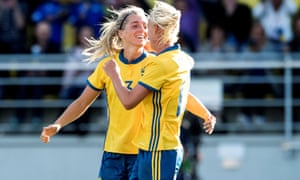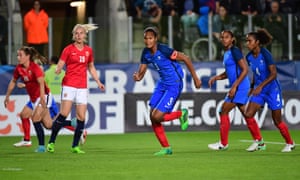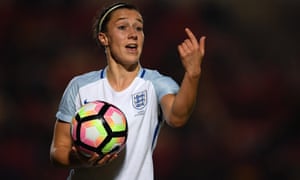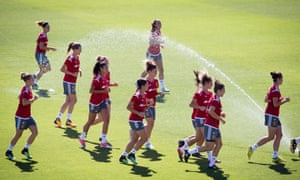Euro 2017: team-by-team guide to the tournament in the Netherlands | Football
The European Championship kicks off on Sunday, 16 July, with Germany the favourites to win their seventh consecutive tournament. Here we look at all the teams and how they may line up in the Netherlands.
GROUP A
Belgium
The Red Flames have just achieved their highest Fifa ranking of joint 22nd and make history again as they play in their first international tournament. Belgium use a relatively conventional 4-4-2, with two banks of four supporting arguably their two best players in the forwards Janice Cayman and Tessa Wullaert, who have 50 international goals between them. The 20-year-old Tine De Caigny, usually a central defender, has been deployed in midfield to add steel, while the captain, Aline Zeler, will lead from the back having spent much of her career as a forward. Belgium are outsiders but the experience of their first Euros should serve as a good foundation. Priya Ramesh
Denmark
An attacking team who play in a 3-4-3 with the emphasis on the wings and in particular the left flank, where the Barcelona defender Line Roddik and Katrine Veje, who has just joined Montpellier, are capable of putting defences on the back foot. The key player is the captain, Pernille Harder, of Wolfsburg. The side’s attacking mastermind is arguably the hardest working player too, making chances as well as taking them. The approach of the coach, Nils Nielsen, means the Danes are likely to create a lot of openings but could be vulnerable to counterattacks. The main weakness is that they can be pressured into making mistakes in defence, especially by physically stronger teams. Jesper Engmann
Holland
As the Dutch captain, Mandy van den Berg, has noted, this tournament is a chance to invigorate home support for women’s football. Under Sarina Wiegman as coach, Holland attack with impetus and four stellar attackers will be looking to impress. Arsenal’s Daniëlle van de Donk will try to cut through the opposition with her passing, while the wingers, Lieke Martens and Shanice van de Sanden, can set up and finish attacks. But the spotlight will be on the striker Vivianne Miedema. She turned 21 yesterday, yet has 50 caps and 39 goals before today’s opener against Norway. After three seasons at Bayern Munich, she has joined Arsenal. Miedema will be looking to replicate her performance at the Under-19 Euros in 2014, when she scored six goals, including the winner in the final against Spain. Priya Ramesh

Norway
Norway’s new coach, the Swede Martin Sjogren, is expected to move away from direct 4-3-3 or 4-5-1 formations, with one deep-lying midfielder keeping the balance behind two box-to-box players, and wingers posing a threat in behind. Sjogren has opted for a narrower 4â€'3â€'1â€'2, with no wingers and a much greater focus on keeping possession and playing through the middle. The team’s No10, Caroline Graham Hansen, operates in the area between the opponents’ midfield and defence. The other key players are the goalkeeper Ingrid Hjelmseth, the captain, Maren Mjelde, who can play in defence and midfield, and the Lyon striker Ada Hegerberg. Lise Klaveness
Group B
Germany
The team to beat, Germany have won the past six Euros and eight overall. No other team have won it since Norway in 1993. The team has changed since last year’s Olympic gold in Rio but the coach, Steffi Jones, says: “We want to win the Euros again. I have a sensational squad and the only team who can beat us is ourselves.†They have lost some key personnel to injury but the captain, Dzsenifer Marozsan, is the best player in the world, according to Jones. The Lyon midfielder is hugely important and was the best player on the pitch when Germany beat Brazil 3-1 in their last friendly before the tournament. The team play 4-4-2 in a tiki-taka style with the onus on attack. It would be a surprise if they did not win yet another Euro. Marc Schmidt

Italy
As you might expect from an Italian team, Antonio Cabrini’s side are built on defensive solidity. Cabrini, a 1982 World Cup winner, has picked a squad with a good mix of young and older players, capable of playing either 4-4-2 or 4-3-3. Daniela Stracchi and the charismatic captain, Melania Gabbiadini, were born in 1983 while at the other end of the experience spectrum there is the 19-year-old midfielder Manuela Giugliano. Elisa Bartoli, Sara Gama and Elena Linari are the main defensive pillars in a side that are disciplined and keep their shape. Italy can also count on the prolific scorers Ilaria Mauro and Cristiana Girelli and Cabrini will feel his team can get through, despite the toughest of draws. Francesca Fumagalli
Russia
Russia edged into the final automatic place on goals scored but their manager,
Elena Fomina, has claimed that their indifferent qualifying results may lead the other teams to underestimate them. Fomina, the first Russian woman to manage the team, will send out a good mix of youth and experience in either a 4-3-3 or 4-2â€'3â€'1. Many key players, including the forwards Elena Danilova and Ekaterina Sochneva, are over 30 but he team are balanced by talented youngsters such as Nadezhda Karpova, a 22-year-old forward picked as the world’s most promising female player by Lionel Messi. “We understand that this generation will retire quite soon,†Fomina said. “But they know how to win at major tournaments, because they won Euro Under-19 in 2005.†Maria Makarova
Sweden
This will be Pia Sundhage’s last tournament in charge and the coach believes the team can use that to their advantage: “It makes you appreciate the now and you are thankful for the journey you have had. It is a feeling that creates a lot of energy,†she said. Sweden are expected to be more attacking than during the Olympics, when they won the silver, and their direct style famously upset the USA’s Hope Solo. The goalkeeper Hedvig Lindahl is hugely important, while Caroline Seger is the side’s heartbeat in midfield. Sundhage has said that if it is not happening for Seger, then the whole team will struggle. The Swedes have reached at least the semi-finals in five of the past six Euros. But they are predictable going forward and do not score as many goals as they should. Fredrik Jonsson

Group C
Austria
Austria are very flexible and can play in several formations. In qualification, they often played 4-3-3 but can easily switch to a 5-3-2, 3-5-2 or 4-4-2. Austria do not have one outstanding player but several important ones. The Bayern Munich centre-backs Viktoria Schnaderbeck (who is the Austria captain) and Carina Wenninger, the midfielders Sarah Zadrazil and Laura Feiersinger and the goalkeeper Manuela Zinsberger are key players. Dominik Thalhammer’s side conceded four goals in qualifying and arrive in good spirits for their Euros debut. Thalhammer will use a pressing game, relying on Nicole Billa and Nina Burger for goals, but they tend to take too few of their chances. Birgit Riezinger
France
The 46-year-old Olivier Echouafni took over from Philippe Bergeroo in September and his new-look side play possession football, mainly 4-4-2 or 4-3-3. The Lyon side that won the Champions League provides the backbone of the team. The Lyon and France captain, Wendie Renard, is considered to be among the best defenders in the world. The two strikers Marie-Laure Delie (PSG) and Eugénie Le Sommer (Lyon) have scored more than 120 international goals between them. Traditionally, Les Bleues do not concede many but they do not score too many either, despite often dominating possession. This is one of the main reasons they have stalled in the quarter-finals at Euro 2013, the 2015 World Cup and last year’s Olympics. Franck Simon

Iceland
Freyr Alexandersson has been forced to switch from 4-3-3 to 3-4-3 to cope with the many injuries his team have suffered in the buildup, after an impressive qualifying campaign when they pipped Scotland to first place in their group. Whatever the system, Iceland’s unity will always be at the fore â€" they attack and defend together as one cohesive unit. It will take some time before the players are completely comfortable with the new formation but at least they have Sara Bjork Gunnarsdottir. A German double winner with Wolfsburg last season, the captain is expected to run the show in midfield as Iceland look to repeat their trip to the quarter-finals in 2013. Andri Yrkill Valsson
Switzerland
“Our squad is a really good mix of young and old, all the way from the 18-year-old Géraldine Reuteler to the players over 30,†says the coach, Martina Voss-Tecklenburg. Switzerland usually play in a 4-1-3-2 or 4-4-2 formation with the Chelsea forward Ramona Bachmann playing a key role. The team has huge potential going forward, with Wolfsburg’s Lara Dickenmann supporting Bachmann up front and Frankfurt’s Ana Maria Crnogorcevic chipping in with goals from right-back. Potsdam’s Lia Wälti and most-capped players Caroline Abbé and Martina Moser (both 126) also have a key role to play. Much promise, but the Swiss need to prove that they can perform on the big stage. Matthias Dubach
Group D
England
After exceeding expectations at the 2015 World Cup in Canada, where they beat Germany to finish third after heartbreak in the semi-finals, Mark Sampson’s side believe they can win Euro 2017. The squad is made up of full-time professionals â€"although Laura Bassett is without a club after Notts County’s collapse â€" and this team have never been fitter. Off the field, there is a real spirit of togetherness in an experienced squad. If Sampson’s omission of free-scoring Chelsea striker Eni Aluko and the recent departure of long-standing assistant coach Marieanne Spacey have raised eyebrows, gifted individuals including Karen Carney, Jordan Nobbs, Fara Williams, Lucy Bronze and Barcelona-bound striker Toni Duggan are capable of lifting the Lionesses, who underperformed in Sweden in 2013, to new heights. Louise Taylor

Portugal
After a glorious 2016 for the men’s team, Portugal’s women are ready to follow their counterparts’ example. Does that mean they will win the Euros? Almost certainly not â€" this is the first time they have even reached the finals, having beaten Romania in a play-off â€" but they could surprise a few people. The diamond shaped 4-4-2 used throughout qualifying will be seen again, as well as a defensive, organised approach. The coach, Francisco Neto, will want his team to counterattack at pace, especially through the captain, Cláudia Neto, who is a midfielder at Linkoping in Sweden but plays as a forward for the national team. Mariana Cabral
Scotland
Anna Signeul’s side have reached a major tournament for the first time but must cope without three of their best players in Arsenal’s Kim Little, Manchester City’s Jennifer Beattie and Hibernian’s Lizzie Arnot, who are injured. Preparations have been further overshadowed by a recently resolved dispute between the players â€" many of whom juggle football with full-time jobs â€" and the SFA. Signeul will become Finland’s coach in September after 12 years in charge and will hope to leave on a high. The Swede will be particularly dependent on Gemma Fay, the 200-cap goalkeeper who is also an actor, the long-serving defender Ifeoma Dieke and the Manchester City striker Jane Ross. Louise Taylor
Spain
Spain qualified for the 2015 World Cup â€" their first appearance â€" but after picking up one point from a possible nine the manager, Ignacio Quereda, who had been in charge for 27 years, was dismissed, with the players complaining of old-fashioned methods and lack of planning. Jorge Vilda came in and the results have improved, with the team winning all their Euro 2017 qualifiers. The team traditionally use 5-3-2, which evolves into a 3-5-2 with the wing-backs pushing up in attack. Barcelona’s Jennifer Hermoso is the main striker, finishing the Liga Iberdrola as the top scorer with 35 goals; she recently signed for Paris Saint-Germain. Dani Terra Ibáñez


0 Response to "Euro 2017: team-by-team guide to the tournament in the Netherlands | Football"
Posting Komentar